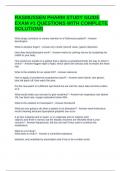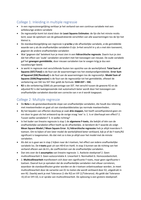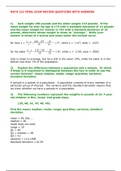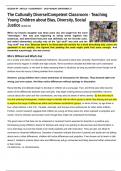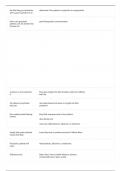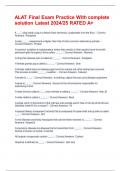Cognitive Behavioural Processes across Disorders | Summary
Week 1 | Meaning
Article 1 | The weight of being: Psychological perspectives on the existential moment
| Hirsh (2010)
The English language is laden with terms like ‘‘heavy,’’ ‘‘weightiness,’’ or ‘‘gravitas’’
to describe events or situations with substantive personal and social significance. Because
such metaphors can be useful in organizing our thoughts about a particular domain, the
current paper aims to extend and elaborate upon the gravitational metaphor of personal
meaning.
The prefrontal cortex and the higher-order regulation of behaviour
One of the defining characteristics of human evolution is that the human brain has a
much larger prefrontal cortex (PFC) relative to that of other animals. A primary role of the
PFC is to organize thoughts, behavior, and emotion in line with achieving one’s current goals.
The PFC allows current plans and situational cues to modify patterns of stimulus-response
associations and behavioral output.
Although human behavior is still regulated by phylogenetically older motivation
systems, the PFC helps to nest these basic biological instincts within a set of higher-order
goals.
Goal-directed behaviour
Humans appear to reduce this interpretive complexity by structuring perception,
cognition, emotion, and action around the achievement of different goals. Because
understanding the ‘‘objective’’ meaning of an event is a philosophical and psychological
impossibility, only that information which is relevant to our current processing goals is
extracted from the environment. Because high-level goals act as organizing principles around
which meaning is constructed, the sudden removal of these goals can result in tremendous
anxiety, uncertainty, and temporary loss of personal meaning.
Meaning and neural plasticity
Goal structures organize the processing of sensory information by selectively
deploying attention towards goal-relevant stimuli. Thus, for instance, someone with the goal
of finding food will have an enhanced perception of food-related objects, a greater
accessibility of food- related words, and will experience emotional responses to events that
help or hinder the goal of food acquisition. Importantly, however, not all goals will produce
the same degree of emotional response when progress is advanced or thwarted.
The weight of being and existential relativity
The ‘‘existential weight’’ of a given moment can be understood as the extent to which
it relates to the highest levels of one’s goal structures. Weighty moments are those in which
one’s deepest goals and values are affected, paralleled by consequent bursts of neurochemical
activity in the brain. An implication of this view is that human experience can best be
understood as operating across five dimensions: three dimensions of space, a fourth
dimension of time, and a fifth dimension of human meaning. The most meaningful
experiences are those that profoundly change an individual.
Individual differences
, 2
Because the significance of an experience is always determined in relation to a set of
goals, different people can have varying interpretations of the same event. Important
experiential differences will also occur depending on whether someone adopts a narrowly
defined goal or an open-ended goal. Research in personality psychology suggests that there
are certain individuals who are more likely to adopt narrow or open-ended goals. In particular,
the personality trait of Openness to Experience is related to the adoption of more open-ended
goal structures. Individuals with higher levels of this trait perceive a broader range of
meanings in their environment, and consequently demonstrate greater plasticity in their
cognitive organization
Ethical implications
To experience this weight is to feel that there are real, significant consequences to
one’s actions. Living life in such a manner places a great deal of moral responsibility with the
individual. Conversely, to believe that there are no meaningful consequences to one’s actions
is to forfeit all ethical responsibility. Simply put, there is less pressure to act in the appropriate
manner if there is no investment in a goal structure.
Obsession and addiction
Greater personal responsibility, if taken too far, can also lead to obsession and
addiction. The more that an individual believes in his or her goal structure, the more
imperative it will seem to act towards the goal. Taken to the extreme, this can result in a
complete negligence of other life domains that don’t directly relate to the goal.
Summary
The gravitational metaphor for the experience of meaning is useful when contrasting
moments of profound significance with those of fleeting importance. The present model
extends and elaborates upon this metaphor, drawing upon work in philosophy and
neuroscience to propose a psychological explanation for the weight of being. One of the
benefits of this framework is that it begins to outline the psychological parameters of personal
meaning, along with some of its ethical, emotional, and experiential consequences. Such an
approach is in line with the growing emphasis in psychology that humans can best be
understood as meaning-making creatures. Understanding the processes by which meaning is
created, along with the role that personal meaning plays in psychological functioning remain
important topics for future research and discussion.
Article 2 | The Effects of a Meaning-Centered Intervention on Meaning in Life and Eating
Disorder Symptoms in Undergraduate Women With High Weight and Shape Concerns: A
Randomized Controlled Trial | Sanne F.W. van Doornik, Klaske A. Glashouwer,
Brian D. Ostafin, Peter J. de Jong (2023)
Eating disorders are severe mental disorders that are often associated with impairments
in physical health, psychosocial functioning, and emotional well-being. Despite the growing
evidence base for current treatments, many individuals with eating disorders fail to access
treatment, drop out during treatment, or relapse after successful treatment. Therefore, it is
important to develop new treatment options focusing on factors that contribute to eating
disorders. One factor that has been proposed to be relevant in the development and
refractoriness of eating disorders is reduced meaning in life. In the present randomized
controlled trial we therefore examined the efficacy of a meaning-centered psychotherapy
protocol that was tailored to eating disorder problems.
, 3
Studies have shown that individuals with an eating disorder report lower meaning in
life, lower satisfaction with meaningful life domains, and lower existential well-being (than
individuals without an eating disorder. Furthermore, meaning in life was found to be inversely
related to eating disorder psychopathology in individuals with eating disorders and to
moderate the relationship between eating disorder psychopathology and suicidal ideation.
Over the years, a number of therapeutic approaches focusing on meaning in life has
shown to be effective in improving quality of life and reducing psychological distress. One of
these therapies is meaning- centered psychotherapy (MCP). MCP was originally designed as a
group-based intervention for individuals with advanced cancer, aiming to help these
individuals enhance or sustain a sense of meaning by identifying and pursuing sources of
meaning.
MCP-ED consists of 6 weekly, individual treatment sessions. The current study was a
first attempt to investigate the effectiveness of MCP-ED. Therefore, we designed a
randomized controlled trial in which a large sample of women with high weight and shape
concerns was included. As a primary aim, we wanted to examine whether MCP-ED was
effective in increasing meaning in life.
Methods
Measurements
o Meaning in life: Life meaning was assessed with the Meaning in Life Questionnaire.
Components of meaning in life: The Multidimensional Existential Meaning Scale
(MEMS;) contains three subscales to index each of the three components of the tripartite
model of life meaning: comprehension, purpose, and mattering.
o Components of meaning in life. The Multidimensional Existential Meaning Scale
(MEMS) contains three subscales to index each of the three components of the tripartite
model of life meaning: comprehension, purpose, and mattering.
o Eating disorder symptoms. Eating disorder symptoms were indexed by the Eating
Disorder Examination Questionnaire 6.0.
o General distress. The 21-item Depression, Anxiety, and Stress Scales (DASS-21) was used
to assess general distress.
o Psychological well-being. Psychological well- being was indexed by the Ryff’s
Psychological Well-Being Scales.
o Satisfaction with normative life domains. The Brief Multidimensional Students’ Life
Satisfaction Scale-College version (BMSLSS-C) was used to assess satisfaction with
normative life domains.
Meaning-centered psychotherapy for eating disorders (MCP-ed)
The aim of MCP-ED is to sustain or enhance a sense of meaning in order to facilitate
the process of overcoming weight and shape concerns.
Results
Participants in the experimental condition reported significantly higher levels of life
meaning immediately after the intervention and at follow-up than participants in the waiting-
list control condition. Increased meaning in life was associated with improvement in eating
disorder symptoms, both at post assessment and at follow-up. Likewise, increases in
comprehension, purpose, and mattering were associated with improvement in eating disorder
symptoms, at both time points.
Discussion
, 4
The present randomized controlled trial investigated the efficacy of MCP-ED to
increase meaning in life among women with high weight and shape concerns. In line with our
hypotheses, the intervention showed to be effective in increasing meaning in life directly after
the intervention and at 1- month follow-up, with large effect sizes. With respect to the
secondary outcomes, evidence was found that MCP-ED also reduced eating disorder
symptoms and general distress, whereas it increased the meaning in life components of
comprehension and mattering, psychological well- being, and satisfaction with meaningful
life domains, with medium to large effect sizes. These findings support the efficacy of the
MCP- ED as an intervention to increase meaning in life. Following MCP-ED, participants
experienced their life as being of more significance and value in the world.
To conclude, the present study provides some first evidence that MCP-ED is an
effective intervention for improving life meaning in women with high weight and shape
concerns. Promising, MCP- ED also proved to be effective in decreasing eating disorder
symptoms directly after the intervention and at 1-month follow-up. Therefore, an important
next step would be to test the effectiveness of MCP-ED to improve meaning in life in a
clinical sample of individuals with an eating disorder, and also test whether MCP-ED could
serve to improve eating disorder symptoms among these individuals. If this is the case, MCP-
ED could potentially be an important add-on intervention to the treatment of eating disorders.
Article 3 | Meaning in life: Clinical relevance and predictive power | Dominique Louis Debats
(1996)
Theories on psychological well-being have traditionally emphasized the absence of
negative affect and psychopathology at the expense of other important facets of mental health.
Starting from different theories several studies have been conducted also to empirically
investigate the relevance of the life-meaning concept to psychological well-being. In some
investigations meaning in life was found to operate as a mediator of mental health outcomes.
In addition, a number of studies have investigated the interactive effects between trauma and
process of ascribing meaning to life with a wide variety of populations, including survivors of
holocaust, combat, natural disaster and untimely bereavement.
The relevance of meaning in life aspects to psychotherapy process and outcome has
been emphasized by, among others, Bugental, Frankl, Jung and Yalom. These theorists have
postulated that meaningfulness relates to positive well-being outcomes, whereas
meaninglessness relates to pathological ones. Although the concepts of meaningfulness and
meaninglessness refer to complex phenomena, they are briefly defined here as presence or
absence of the feeling that one can make sense of or find order or coherence in one’s
existence.
Few studies have empirically tested the clinical relevance of meaning in life aspects to
psychotherapy outcome. The studies, which have employed addictive patients only, have
shown that (a) high prevalence of lack of meaning and purpose in life exists among
alcoholics; (6) initial level of meaning in life predicts the final degree of addiction and (c)
high sense of purpose in life at the end of treatment predicts the outcome three months after
psychotherapy. The present investigation aims at exploring the relations between aspects of
meaning in life and dimensions of psychological well-being. It has been hypothesized that
patients’ levels of meaning in life play a hidden, yet crucial, role in the process and outcome
of psychotherapy.
The following predictions are tested:
1. Different aspects of meaning in life correlate significantly with well-being and affect
well-being independently of one another as well.
2. Meaning in life is related to improvement during psychotherapy.


